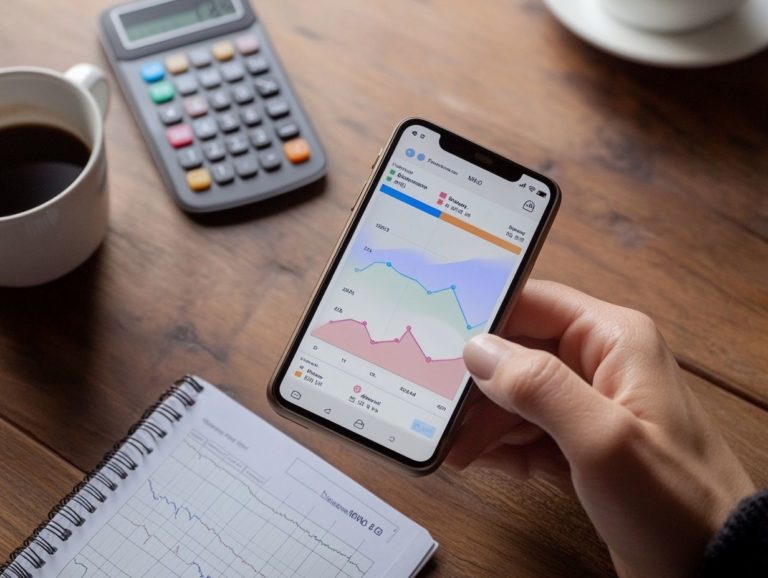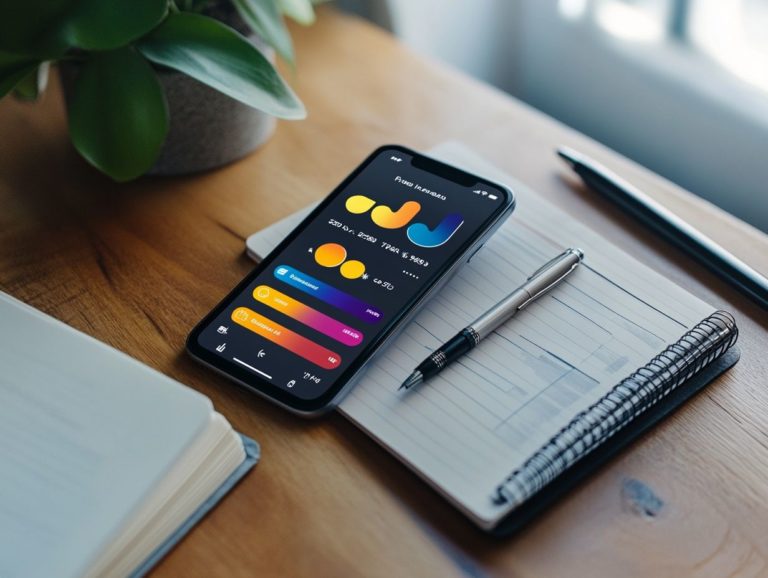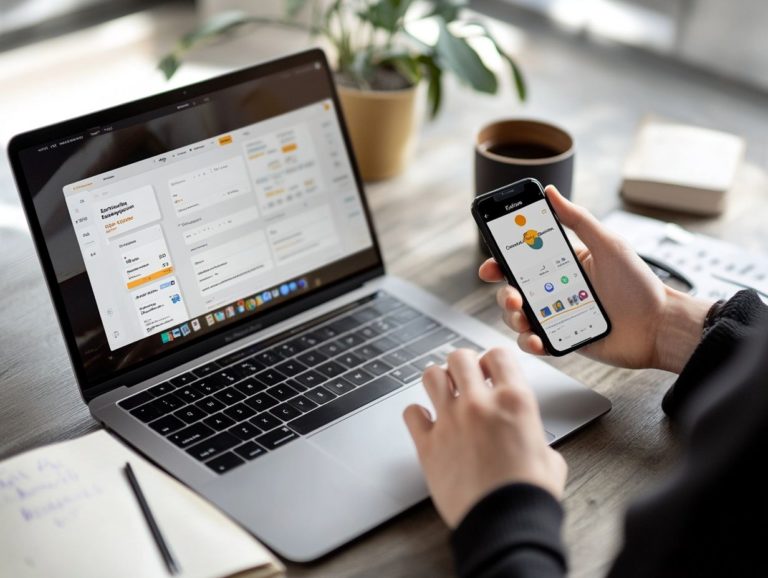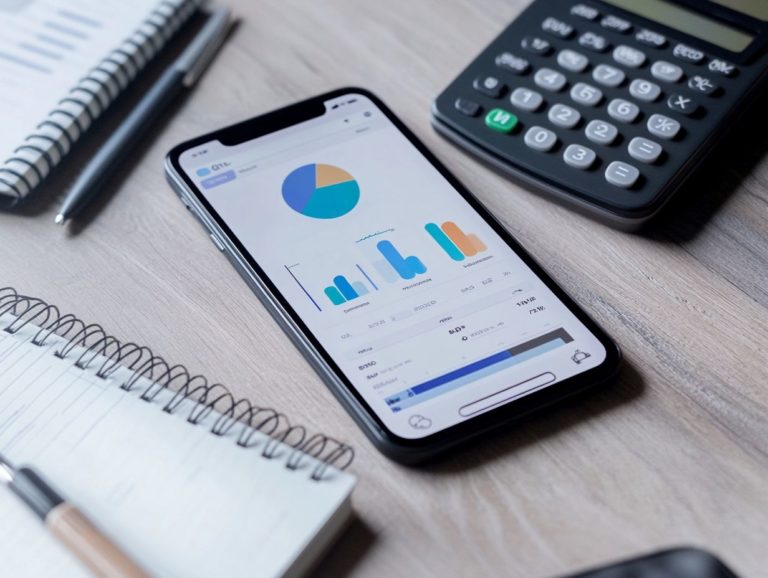How to Use Budgeting Tools for Long-Term Goals
Budgeting transcends the simple act of balancing income and expenses; it serves as a powerful tool for attaining your long-term financial aspirations.
This article delves into the fundamental aspects of budgeting tools, covering their definition, purpose, and the diverse range available both manual and automated.
Uncover the advantages of utilizing these tools, along with tips for selecting the one that aligns perfectly with your unique needs, and gain practical insights to optimize your budgeting strategy.
Take charge of your finances today!
Contents
- Key Takeaways:
- Understanding Budgeting Tools
- Benefits of Using Budgeting Tools
- Types of Budgeting Tools
- How to Choose the Right Budgeting Tool
- Tips for Using Budgeting Tools Effectively
- Frequently Asked Questions
- 1. What are long-term financial goals?
- 2. Why is budgeting important for long-term goals?
- 3. What are some budgeting tools for long-term goals?
- 4. How can I stay motivated to stick to my budget for long-term goals?
- 5. Can budgeting tools help me save for multiple long-term goals at once?
- 6. How often should I review and adjust my budget for long-term goals?
Key Takeaways:

- Understand the purpose and benefits of budgeting tools to improve financial management and increase savings for long-term goals.
- Choose the right budgeting tool that fits your lifestyle, whether manual or automated, and explore popular apps or software.
- Effectively use budgeting tools by setting realistic goals, regularly reviewing and adjusting budgets, and sticking to a budget to achieve long-term goals.
Understanding Budgeting Tools
Understanding budgeting tools is essential for you if you aim to manage your finances effectively and learn how to use budgeting to achieve your goals.
These tools help you create a personal budget that allows you to track your spending, prioritize savings, and make informed financial decisions. Use budgeting strategies to manage your expenses and income better, ultimately enhancing your financial literacy and providing a clearer path to achieving your goals.
Benefits of Using Budgeting Tools
Using budgeting tools presents numerous benefits for your financial management. They enable you to achieve your financial goals with greater efficiency.
These tools help you take command of your spending habits, prioritize your expenses, and craft a realistic savings plan that aligns with your objectives.
By effectively tracking your income and categorizing your expenditures, you can not only save money but also establish automatic savings that will significantly contribute to your financial success.
Improved Financial Management
Improved financial management is one of the standout benefits of using budgeting tools, as they offer you a clear overview of your income and expense categories. By grasping your net income and tracking your spending habits, you can prepare for unexpected expenses and review your budget effectively to make the necessary adjustments.
These tools not only clarify where your money is going but also enable you to manage your income proactively, ensuring that essential bills and savings goals take priority. The ability to categorize spending fosters a heightened awareness of your lifestyle choices, enabling you to cut back on discretionary expenses when needed.
Regularly reviewing your budget especially after life throws its curveballs your way enhances your adaptability in financial planning. With these insights at your fingertips, you are more likely to feel empowered in your financial decisions, ultimately leading to less stress and greater security in achieving your long-term financial objectives.
Increased Savings and Goal Achievement
Increased savings and achieving your goals are two critical outcomes of effectively utilizing budgeting tools. By setting a specific savings target and diligently monitoring your progress, you can make informed decisions about cutting costs and prioritizing your spending to meet those financial aspirations.
Celebrating milestone along the way serves as an added incentive, keeping you motivated and focused on the path ahead.
These tools enable you by offering a clear overview of your financial landscape, allowing you to pinpoint areas where you can save more effectively. Regularly tracking your expenditures not only highlights unnecessary spending but also encourages a proactive approach to financial planning.
As you align your spending patterns with your savings targets, you gradually build wealth while alleviating financial stress.
Rewarding yourself for reaching specific milestones transforms your journey toward financial stability into a more fulfilling experience, ultimately keeping you engaged and enthusiastic about your financial health.
Ready to transform your financial future? Start your budgeting journey today!
Types of Budgeting Tools

Are you ready to master your finances? Discover the various budgeting tools that fit your lifestyle! You ll find a variety of budgeting tools designed to meet diverse preferences and needs, from manual approaches to fully automated solutions.
Manual tools typically involve spreadsheets or even paper-based methods. These allow for hands-on management of your finances.
On the other hand, automated tools include budgeting apps and software that effortlessly sync with your bank accounts. They provide a seamless way to track your spending.
For a more tailored experience, consider consulting a financial advisor, who can offer personalized guidance to help you select the budgeting tools that best suit your unique situation.
Manual vs Automated Tools
When you compare manual and automated budgeting tools, you’ll discover that each offers unique advantages and disadvantages tailored to your financial planning needs.
Manual tools often require a hands-on approach, using spreadsheets or notebooks. Automated options, such as budgeting apps, allow for real-time tracking of expenses linked directly to your checking account.
The tactile nature of manual budgeting fosters a deeper engagement with your financial habits. It encourages you to be aware of your spending habits.
However, this method can be time-consuming and may lead to errors or missed entries.
Automated tools simplify the budgeting process. They provide instant updates and alerts to keep you on track.
Yet, some may find that these apps disconnect them from their finances, which could lead to a lack of awareness regarding their spending patterns.
Ultimately, the choice between these methods depends on your personal preferences and your overarching financial management goals.
Popular Budgeting Apps and Software
Among the most popular budgeting apps and software are options like iGrad and various online and mobile banking platforms. They truly shine with their user-friendly interfaces and strong features.
These tools enable you to manage your finances effectively. They offer a range of functionalities from expense tracking to personalized financial advising.
Take iGrad, for example; it not only provides insights into your spending habits but also delivers tailored advice based on your unique financial goals.
Other apps integrate seamlessly with online banking. They offer real-time updates on your account balances and transactions, which encourages a proactive approach to budgeting.
Mobile banking solutions give you the flexibility to monitor your budget on-the-go. This makes it easier to adhere to your planned expenditures.
Many of these platforms also offer educational resources. They equip you with the knowledge to deepen your understanding of finances while enhancing your overall financial well-being.
How to Choose the Right Budgeting Tool
Choosing the right budgeting tool is an exciting opportunity to take control of your finances! It demands a thoughtful evaluation of your unique needs and financial aspirations.
Each individual has distinct priorities in managing their finances, whether it s zeroing in on specific expense categories, building an emergency fund, or strategizing for long-term objectives like retirement or college savings.
Considerations for Personal Needs and Goals
When evaluating budgeting tools, it’s essential for you to consider your personal needs and long-term financial goals. This might include visualizing your budget with tools for crafting a savings plan for unexpected expenses or specific life events, such as buying a car or a home.
Different budgeting strategies will suit different lifestyles. So understanding your unique financial situation is crucial.
For instance, you might want to factor in your monthly income, recurring bills, and discretionary spending. This ensures that your financial blueprint aligns with your current realities and future aspirations.
Establishing an emergency fund is vital; it acts as a safety net against life’s uncertainties. Planning for retirement or setting aside funds for your children’s education are also pivotal objectives that can significantly influence your savings plan.
Regularly reviewing and adjusting these plans allows you to maintain flexibility as your personal circumstances evolve. This underscores the importance of adaptability in achieving financial success.
Take the first step by assessing your financial goals today!
Tips for Using Budgeting Tools Effectively

Using budgeting tools effectively requires following certain tips that can elevate how you handle your money. It’s essential to set realistic goals and explore the best tools for tracking financial goals, enabling you to establish achievable savings targets.
Regularly reviewing your budget is equally important. It helps you adapt to changing financial circumstances and stay on track towards your objectives.
Setting Realistic Goals and Sticking to a Budget
Setting realistic goals is essential for maintaining a budget. It cultivates financial discipline and helps you prioritize your spending effectively.
By categorizing your expenses and pinpointing areas to cut back, you position yourself to save more and reach your financial objectives. Gaining a clear understanding of your financial landscape can significantly enhance your ability to meet these goals.
Many individuals find that breaking down their budget into manageable categories like necessities, discretionary spending, and savings can lead to greater success.
This method clarifies where your money is going and helps you spot patterns that may trigger overspending. Establishing routines, like reviewing your expenses weekly, reinforces disciplined budgeting and offers a constant check on your financial priorities.
By committing to these strategies, you increase the likelihood of staying aligned with your overall financial well-being.
Regularly Reviewing and Adjusting Your Budget
Are you reviewing your budget regularly? It s key to staying financially healthy, especially when facing setbacks or changes in income. Continuously tracking your expenses and adapting your budgeting strategies ensures that your financial plan aligns with your goals and priorities.
Budgeting is more than just crunching numbers. It encourages you to take charge of your finances. When unexpected expenses pop up or your income shifts, revisiting your budget allows for quick recalibration, minimizing stress and uncertainty.
A thorough review process can reveal areas where you might trim spending, enabling you to reallocate funds toward more pressing needs or savings. As your financial landscape evolves, this vigilance supports immediate survival and fosters long-term stability and growth.
You can navigate challenges with confidence and resilience by staying proactive.
Frequently Asked Questions
Got questions about budgeting? Let’s dive in!
1. What are long-term financial goals?
Long-term financial goals are targets that span several years and require patience and planning. Examples include saving for retirement, buying a house, or paying off a large debt.
2. Why is budgeting important for long-term goals?

Budgeting helps you see where your money goes and lets you focus on your goals. It allows you to identify areas to cut back on expenses and allocate more funds toward your long-term goals.
3. What are some budgeting tools for long-term goals?
There are various budgeting tools available, such as apps, spreadsheets, and online calculators. Popular tools include Mint, You Need a Budget (YNAB), and Personal Capital.
4. How can I stay motivated to stick to my budget for long-term goals?
One way to stay motivated is to regularly review and track your progress. Seeing your savings grow helps you stay on track. Setting smaller milestones helps you feel accomplished.
5. Can budgeting tools help me save for multiple long-term goals at once?
Yes! Budgeting tools can help you manage and save for multiple long-term goals simultaneously. Many apps, including top budgeting tools for sustainable living, allow you to create separate categories or sub-budgets, making it easier to track progress.
Explore these tools today and start reaching your financial goals!
6. How often should I review and adjust my budget for long-term goals?
Review your budget for long-term goals at least once a month. If your financial situation or goals change significantly, adjust your budget more often.
Regularly checking your budget helps ensure you stay on track toward your long-term goals. This is essential for achieving the financial future you desire!






